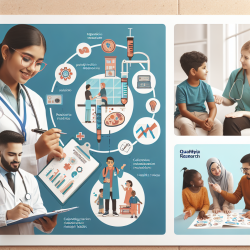Introduction
In the realm of speech-language pathology, the pursuit of data-driven decisions is paramount. As practitioners, we strive to leverage scientific findings to enhance therapeutic outcomes, particularly for children. A recent study titled "Screening of immunogenic proteins and evaluation of vaccine candidates against Mycoplasma synoviae" offers valuable insights that can be translated into improved practices within our field.
Understanding the Research
The study, published in NPJ Vaccines, explores the identification of potential subunit vaccine candidates for Mycoplasma synoviae (M. synoviae), a significant avian pathogen. The research utilized immunoproteomics and reverse vaccinology to identify 24 candidate antigens, with five showing promising immunogenicity and preliminary protection in a chicken model. These findings are crucial as they provide a foundation for developing new-generation vaccines, which could significantly impact public health and, indirectly, speech-language pathology.
Relevance to Speech-Language Pathology
While the direct link between M. synoviae and speech-language pathology may not be immediately apparent, the methodologies and outcomes of this research are highly relevant. The study exemplifies the power of data-driven approaches and the importance of leveraging scientific advancements to improve therapeutic practices.
For practitioners, the following key takeaways can be applied:
- Data-Driven Approaches: Embrace methodologies such as immunoproteomics and reverse vaccinology to identify potential therapeutic targets. In speech-language pathology, similar data-driven approaches can be employed to identify effective interventions and tailor them to individual needs.
- Collaboration Across Disciplines: The study underscores the importance of interdisciplinary collaboration. By working with experts in fields such as immunology and bioinformatics, speech-language pathologists can gain insights that enhance their practice.
- Focus on Outcomes: The ultimate goal of any therapeutic intervention is to achieve positive outcomes. By staying informed about advancements in related fields, practitioners can adopt innovative strategies that lead to improved outcomes for children.
Encouraging Further Research
The findings of this study highlight the potential of subunit vaccines as a novel approach to controlling M. synoviae. For speech-language pathologists, this serves as a reminder of the importance of staying informed about advancements in related fields and encourages further research into innovative therapeutic approaches.
By exploring the intersection of vaccine research and speech-language pathology, practitioners can contribute to the development of evidence-based interventions that improve outcomes for children. This may involve collaborating with researchers, participating in clinical trials, or conducting studies that investigate the impact of vaccines on speech and language development.
Conclusion
In conclusion, the research on M. synoviae vaccine candidates provides valuable insights that can be applied to speech-language pathology. By embracing data-driven approaches, fostering interdisciplinary collaboration, and focusing on outcomes, practitioners can enhance their practice and create positive impacts for children.
To read the original research paper, please follow this link: Screening of immunogenic proteins and evaluation of vaccine candidates against Mycoplasma synoviae.










